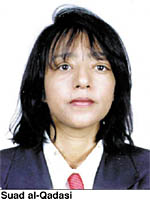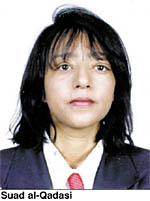
The Manager of Womens Forum for Research and Training, (WFRT) , Suad al-Qadasi to the Yemen Times: Unfortunately, female human rights activists are exposed to harassment and challenges by authorities. [Archives:2002/27/Interview]
July 1 2002
BY YASSER AL-MAYYASI
YEMEN TIMES STAFF

In a country like Yemen, women have actually made laudable strides in economic, social, political and cultural dimensions of the society. Womens increasingly active participation despite the considerable difficulties and obstacles of the past two decades is certainly attributable to the increase in educational facilities. That is, women are not simply restricted to housework and they have started taking up roles in the economic, political and cultural life of our society.
However womens increased contact with the outside world has created some difficulties for them which may, at many times, lead to their encountering the law either as a violator of the law or as a victim of crime. In both cases, women are subjected a law which is written and implemented by men.
In this respect the Yemen Times reporter, Yaser al-Mayassi has met up with the Manager of Womens Forum for Research and Training, (WFRT) , Suad al-Qadasi and filed the following interview:
Q: Will you give us a brief account of the WFRT?
A: The WFRT is the product of strenuous effort. It started exactly when I worked for the American Agency in 1991. I made contacts with foreign women organizations while I was traveling abroad. Through them I could establish strong contacts with a range of distinguished female activists in the field of human rights.
The WFRT was officially inaugurated in June 2000.
Since then, the WFRT was licensed by the Ministry of Culture and Tourism.
This came in response to the economic, political, cultural and domestic situations which were closely related to womens issues and their rights. The WFRT was subsequently entrusted with upholding human rights issues in general and women issues in particular. Greatest attention was paid to the six governorates of Taiz, Sanaa, Aden, Hadhramout, Hajjah and Hodeidah.
One of the main objectives of the WFRT is to raise awareness of womens rights and defend and expand these rights while carefully considering their status in the community. This can be achieved not only at the local level but also in the international arena.
Non-governmental organizations play a vital role in the field of womens rights. The WFRT has a leading role with regard to promoting skills and capabilities of human rights organizations and civil societies. Efforts have been exerted in this field with a view to mapping out a local comprehensive strategy to defend womans rights.
Q: Since its establishment, what are the main activities that have been accomplished by the WFRT?
A: Generally speaking, we are dissatisfied with what has been achieved so far. The WFRT has only been able to make limited progress in its first two years.
The WFRT has many plans to improve womans rights, particularly by collaborating with some of the non-governmental organizations working in this field.
So far 51 different programs have been established by the WFRT in Sanaa, Taiz, Aden, Hajjah, Hadhramout, Dhamar, and Hodeidah. More than 780 male and 460 female participants have taken part in these activities. Governmental and non-governmental organizations have taken part in these activities and made use of the WFRTs expertise in this field.
We have made every effort to involve different bodies such as non-governmental womens organization working in the field of womans rights, as well as, the judiciary, the media, and assorted artists. The WFRTs main objective is try to counter a growing wave of contempt and discrimination towards women.
When reporting on womens issues we have chiefly tried to raise awareness to try to limit discrimination against women. We have tried to do our best to represent a complete image of women in the media and to illustrate the significance of women in society.
The WFRT has been steadily increasing its prominence at an international level and has been establishing relations with other womens organizations in the field of human rights.
We believe that we can help women rapidly improve their administrative skills and aim to shortly begin training female nominees to compete in local council elections. We are confident that the exchange of ideas and experiences between the WFRT and other local and international non-governmental organizations will allow the WFRT to make the best use of others experiences. We have participated in Arab as well as international conferences in defense of womens interests in, for instance, Canada, the United States, Japan, Brazil, South Africa, India, Australia, Thailand, Iran, and Paris. A number of Arab countries have helped the WFRT to prosper and grow as an active organization to defend womens issues at the local level.
A number of publications such as, periodicals, magazines, researches and studies have been issued by the WFRT centering around human rights in general and womens issues in particular.
Q: What are your future plans?
A: As mentioned earlier, we work within a long-term program consisting of research, direct action and various other campaigns.
For instance, field research into the effect of poverty on children will shortly be completed and shall be presented at the end of July.
There will be also a number of symposiums which are to be held in Aden, Sanaa and Taiz focused primarily on womens issues. Besides, a number of vital activities will concentrate on womens rights in the countryside. Three different districts have been selected in Taiz and we hope in extend this program in the future.
At the international level, we been invited by OXFAM to participate in an international conference. Specific difficulties faced by the WFRT are to presented and discussed. We will also participate in the International Development Conference in Johannesburg as well as in the 2nd conference on violence against women in Canada. Different activities in the field of human rights in Arab countries are to be discussed in Tunis, Egypt and Lebanon.
Q: What are the main difficulties faced by the WFRT?
A: The WFRT has faced a number of difficulties particularly with regard to establishing confidence among human right organizations. The main problem is the lack of financial resources. Unhealthy competition from rival non-governmental organizations is one of the main difficulties faced by the WFRT.
Q: As a distinguished activists in the field of human rights, how do assess the current situation?
A: Human rights organizations in Yemen are still novel. Their appearance coincided with unification and the emergence of democracy. These organization are sometimes swim with the tide and some swim against the tide. There is no a unified strategy as regards exchanging information, skills, experiences. Little improvement can be perceived, except much ado about nothing.
The strange thing is that we see that instead of raising awareness of the human rights principles, some organizations prefer to pursue their own interests and are more concerned with their own presentation.
Q: What are the main hindrances of the civil institutional work in Yemen?
A: Non-governmental organizations are one of the civil and local movements which have begun to increase remarkably since the 1990s. Presumably, the state should support them and help them to perform their role. In this respect the state and these non-political associations are the two sides of the same coin. They are complementary to each other. Civil societies can not be prosper unless there is a democratic state based on constitutional constitutions to support these societies.
Q: How do you link women with the human rights activities?
A: Human rights organizations in Yemen are an integral part of the Arab as well as international human right movements. Unfortunately, female human rights activists are exposed to harassment and challenges by the authorities. Arab female human rights activists also are exposed to pressures and harassment.
Initially we felt proud of womens good conditions in Yemen. This has changed. Indeed, I have myself been a victim of insults and harassment. Only recently have recently threatened telephone calls or letters. I have been threatened by two unknown persons who broke into the WFRTs main office in Taiz. They have been arrested and released without interrogation. Through the Yemen Times, I would like to take the opportunity to request that the unknown persons who broke into the WFRTs campus be interrogated by the political security office in Taiz.
Q: Any last comment?
A: We are very grateful to the Yemen Times newspaper for its strenuous efforts in dealing with vital issues in the field of human rights in general and women in particular.
——
[archive-e:27-v:2002-y:2002-d:2002-07-01-p:./2002/iss27/intrview.htm]


